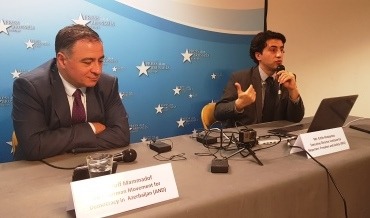The early presidential elections in Azerbaijan on 11 April resulted as expected in the victory of incumbent president Ilham Aliyev. The elections were boycotted by the main opposition parties and heavily criticized by international election observers. At a press conference at Brussels Press Club the following day, Arif Mammadov and Emin Huseynov described the political and economic background to the elections in their home country.
Mammadov, a former Azerbaijani ambassador to the EU who has found asylum in Brussels, explained that the sudden decision two months ago to hold the vote six months ahead of schedule was aimed at shortening the campaign period and ensuring an overwhelming victory for Aliyev.
According to Mammadov, who is co-chairman of the Movement for Democracy in Azerbaijan (AND), the economic situation in Azerbaijan has deteriorated because of the decrease in oil revenues. The reason for holding snap elections could have been to preempt an even worsening economy which has forced Azerbaijanis in large numbers to leave their country.
Political activists have also been forced to leave and are accused by the regime of being spies for Armenia. The two countries are locked in a conflict over Nagorno-Karabakh, an enclave inside Azerbaijan, and fought a four-day war only two years ago.
“The election campaign can be read as taken from a dictator’s handbook,” he said and denounced the elections as totally fraudulent with extensive box stuffing and inflated figures on voter turnout.
Besides the incumbent president, there were seven registered candidates who hardly criticized him, only claiming in a TV debate that they could do a better job than him. Aliyev himself never participated in the debate.
There is no voter threshold in presidential elections but it was important for the president to legitimize his regime by declaring a turnout of 75 %. Actually, according to the opposition, the turnout was only around 25 %.
Around 5.2 million voters are registered in the permanent voter register maintained by the central election committee but other data from state authorities show that this number is almost two million lower than the approximate number of citizens of voting age.
The constitution was changed in 2016 following a referendum and the president can now stay in power for another period of 7 years, with no limit for the number of terms.
Huseynov, executive director of Geneva-based media watchdog Institute for Reporters’ Freedom and Safety (IRFS), described how volunteers had monitored a sample of polling stations and observed, based on cameras at the stations, a huge discrepancy between the actual number of voters and the official figures.
He noticed that lobbyists from other countries and even from the Council of Europe had come to Azerbaijan to endorse the elections despite the imprisonment of journalists and the lack of any real possibility for the opposition to organize rallies around the country and to challenge the regime.
Civil society organisations in Azerbaijan are forbidden to receive funding from abroad and cannot operate any longer in the country, he said and lamented the lack of EU support to civil society. “We have lost hope in EU and other European organisations. If you don’t want to support us, at least protect your own values.”
In a statement the day after the elections, the international election observation commission from OSCE/ODIHR (Office for Democratic Institutions and Human Rights) issued preliminary findings and conclusions which largely confirmed the above assessment by the two speakers.
According to ODIHR, the elections took place “within a restrictive political environment and under a legal framework that curtails fundamental rights and freedoms, which are pre-requisites for genuine democratic elections”. Almost none of previous recommendations were addressed.
“The election lacked genuine competition.” On election day, the international observers reported widespread disregard for mandatory procedures, lack of transparency, and numerous serious irregularities, such as ballot box stuffing. The formula for appointing election commissions does not guarantee an impartial election administration.
“Pressure on voters raised concerns whether the campaign was conducted in a fair and free atmosphere.” ODIHR described the media environment as “characterized by a highly restrictive legislative framework that challenges the freedoms of expression and the press and which extends to websites and social media content”.
As there are no broadcast or print media that critically analyze government policies, dissenting opinions regarding authorities’ performance were absent from newscasts, according to ODIHR.
| EU position A spokesperson for the European External Action Service (EEAS) issued a statement Thursday evening (12 April) and referred to some of ODIHR’s observations. “The EU expects the Azerbaijani authorities to take on board and implement the OSCE/ODIHR recommendations in relation to these and previous elections. The EU stands ready to assist in this process.” Despite or because of the irregularities in the elections, the EU “looks forward to continuing dialogue and working closely with Azerbaijan, including with a view to addressing fundamental issues of democracy and human rights during the renewed term in office of the President.” Relations between EU and Azerbaijan are defined in the context of the so-called Eastern Partnership. Since more than a year, the two sides are negotiating a new comprehensive agreement which will replace the existing partnership agreement. Similar agreements have already been concluded with Armenia and Georgia. Asked by The Brussels Times, an EU spokesperson confirmed that civil society both in Azerbaijan and in the EU “have been consulted and briefed ahead of and throughout the process of negotiations”. “Negotiation documents are not available to the public but consultations will also continue,” said the spokesperson. “The final text will include references to human rights and democracy - and related principles and values on which all of the EU's external relations are based – as well as to cooperation with civil society.” On the question whether the elections will have any consequences for the talks on the agreement, the spokesperson referred to the statement issued after the elections. |
M.Apelblat
The Brussels Times

